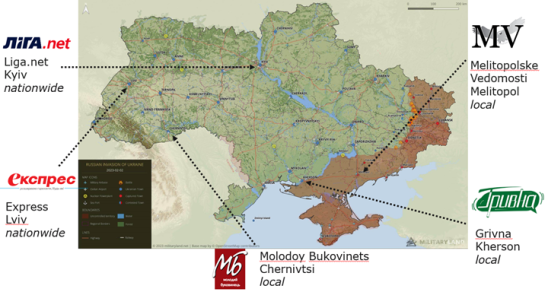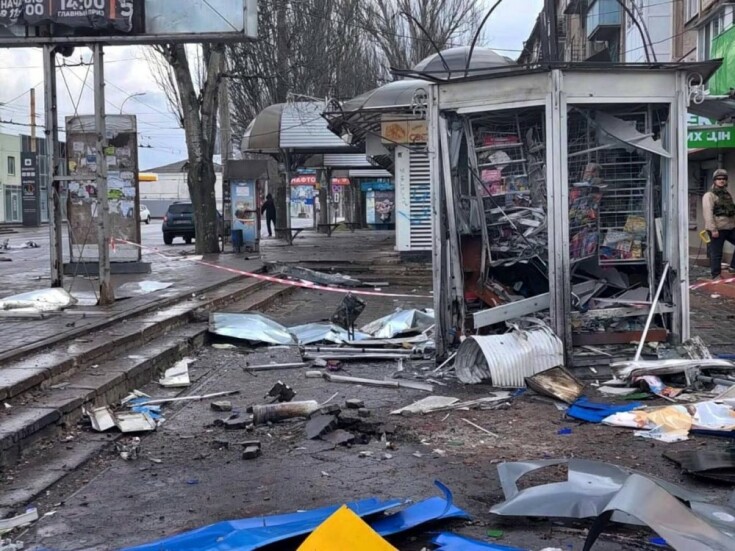The toll on Ukraine after 12 months of war has been huge. On the first anniversary of Russia’s full-scale invasion on 24 February, about 20% of Ukrainian territory remains under Russian occupation. According to a UN estimate, at least 7,110 civilians have been killed and 11,547 have been injured, and out of Ukraine’s more than 40 million population, around 7.5 million people have registered as refugees outside of Ukraine.
Ongoing missile attacks are seriously degrading the country’s energy infrastructure, leaving millions with unsteady access to electricity or completely cut off, and estimates suggest that the Ukrainian budget has lost around 35% of GDP, while inflation in 2022 was running at 26.6%.
Throughout all of this, Ukrainian media have stood tall against oppression and played a vital role in the country’s response to the invasion. They have provided news of developments on the frontline, updates on missile attacks on local neighbourhoods and critical information for refugees seeking safety.
But the challenges are huge, from trying to ensure the safety of journalists in the field to dealing with power blackouts and newsprint shortages. Moreover, this is against a background of huge financial pressure. According to the Ukrainian Ministry of Culture and Information, in the first six month of 2022, the advertising market in the country dropped by 70%.
Since the start of the war, MDIF has been working to support its current and former media clients, as well as a range of regional newspapers. The experiences of the media companies and their brave teams vary greatly but they are united in their belief in serving their communities and standing up for freedom.
Media across the country under siege
Five current and former MDIF clients are based in various regions of Ukraine:

Melitopolskiye Vedomosti, Melitopol: Melitopol was occupied in the very first days of the war and MV stopped its publishing and printing operations shortly after the city was captured. The premises of both the editorial office and the printing house were occupied by the Russian military, although they didn’t manage to put the printing press into operation. Most MV staff managed to escape the city and are now also located outside the occupied zone.
Grivna, Kherson: Kherson was occupied soon after the invasion began. Despite the liberation of the city in November 2022, most of the editorial staff remain outside of the city. Due to regular missile attacks, a lack of supplies and the energy crisis, the Ukrainian government does not recommend that residents return to the city. In January 2023, Grivna’s offices, which used to house both its editorial team and the printing house, were hit by a Russian missile and seriously damaged. The company has no plans to begin reconstruction works until the war is over.
Grivna staff continue to maintain the Grivna.ua website, focusing coverage on developments in the city and neighbouring regions. The editorial team also plans to relaunch the publishing of Grivna newspaper, which will be distributed in the recently liberated city with the support of the Ukrainian Ministry of Culture. The team is operating remotely from the apartments of staff who relocated to safer areas of the country.
Liga.net, Kyiv: Throughout the war, Liga has provided high-quality news coverage in both Ukrainian and Russian. Much of its reporting continues to be devoted to the war, although it allocates an increasing amount of editorial to general business and economic issues, subjects that were its focus before the invasion.
An English-language version of Liga.net was added to the website the day after the full-scale invasion to inform the international community of developments, but was cancelled due to cost-cutting after several months. However, Liga is about to relaunch the sub-site so international readers are able to access a Ukrainian source of independent information in English.
In 2022, Liga ran a highly successful crowdfunding campaign to help cover the revenue shortfall after the advertising collapse following the invasion but is now tackling the ongoing economic challenges by developing a long-term business strategy to bring the company back to sustainability.
Molodoy Bukovinets, Chernivtsi: MB, a local news outlet in Chernivtsi in the west of Ukraine, is well behind the frontline but like other media across the country has faced many challenges over the year. It is currently suffering from severe power blackouts, with electricity unavailable for 10-15 hours a day on some days, which makes publishing a printed newspaper extremely difficult. In addition to reporting on the war, MB focuses its coverage on issues important for local residents and the large numbers of refugees seeking shelter in the region. For example, it regularly updates maps of ‘invincibility points’, special shelters where people can recharge their phones, use the internet and stay warm, and has offered free advertising to services supporting refugees.
Express, Lviv: Express newspaper is distributed to the whole of Western Ukraine and throughout the war has provided in-depth coverage of the latest developments, including the implications for political and economic life. Despite excellent coverage, Express suffered a decline in print circulation in 2022 due to the destruction of its distribution network, the mass emigration of readers and a scarcity of newsprint. Express also suffers from massive power blackouts, with electricity available for only 2-4 hours on most days, and the temperature in the offices around 12-14 degrees at best.
The Ukrayina.pl website, which Express launched in cooperation with Agora, publisher of Gazeta Wyborcza in Poland, for Ukrainian refugees living in Poland, continues to be the most visited website in the Ukrainian language in Poland and has 5-6 million regular visitors a month.
Long-term commitment
Since the start of the war, MDIF and its partners have provided a range of support to the media companies above, including financial, technical and safety, and also provided more than 200 tons of newsprint to regional newspapers. But we understand that these and other challenges will remain as long as Russia persists with its war and that continued support by the international community for the long-haul is required. MDIF, for one, is committed to providing that support for as long as it takes.
